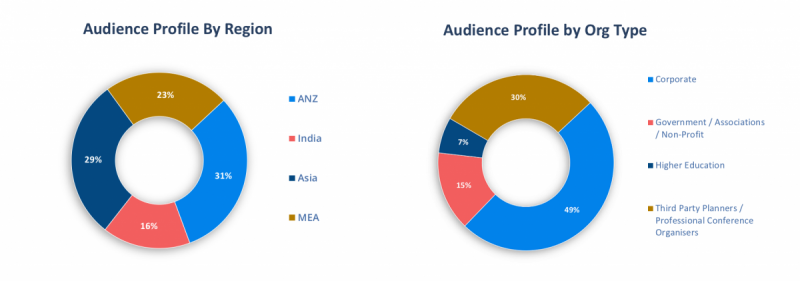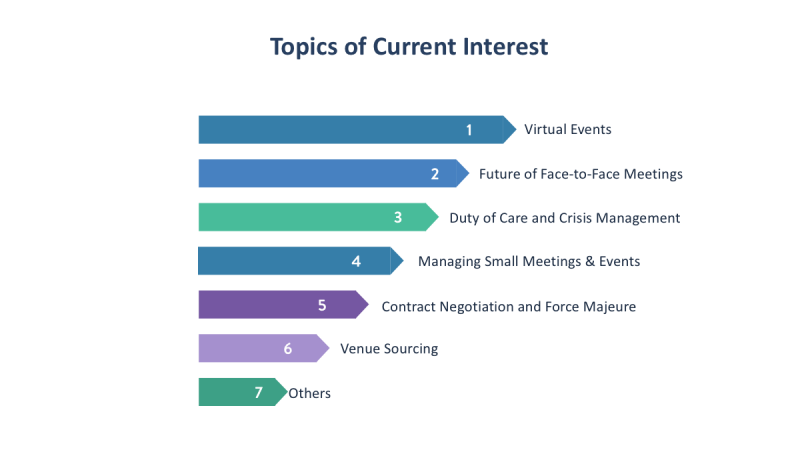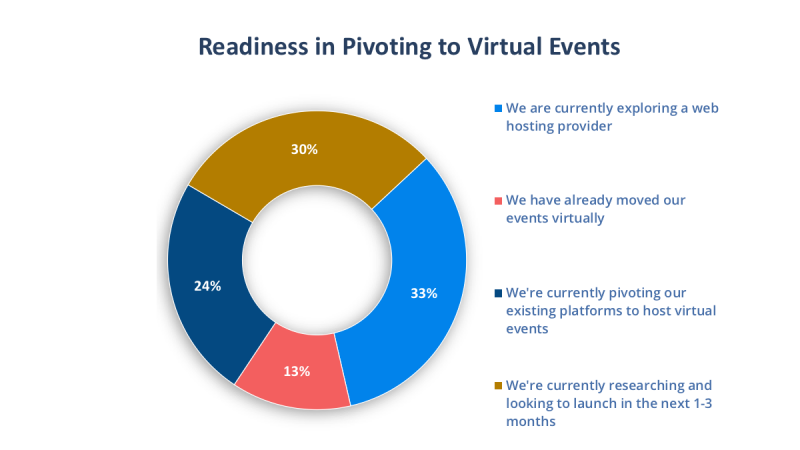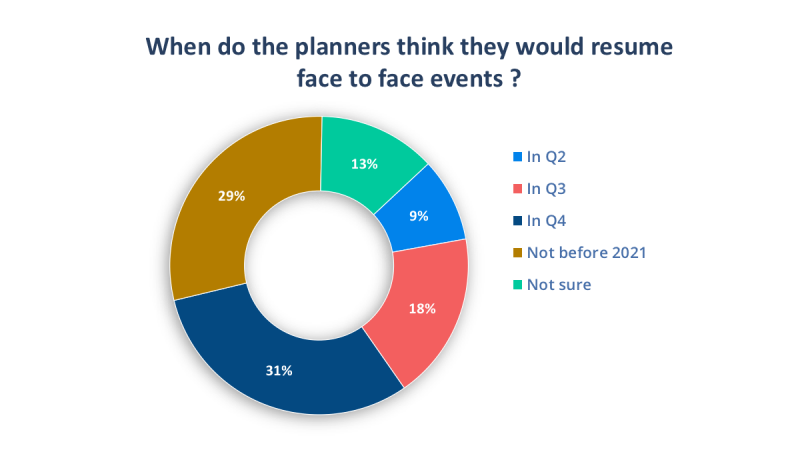Industry Speak: How Are Event Planners Impacted?


Challenging Times for Event Planners
These are challenging times in the meetings and events industry. With the pandemic forcing millions into isolation, and in-person events being cancelled left, right and centre, there’s no doubt that event planners are one of the hardest hit.
What probably makes this all worse is the uncertainty floating around that is forcing organisations across the world to postpone their event plans for the foreseeable future. And since this has turned nearly every organisation’s annual event program upside-down, event planners and marketers are now, more than ever, looking to get the pulse of the industry to figure out how to navigate these choppy waters.
To get an overview of the present state of events across APAC MEA right now, we decided to head directly to the source. In April 2020, we hosted several virtual meet-ups to network with over 360 marketing and event professionals from different industry verticals and regions across APAC MEA, to find out what their thoughts are about the current situation. We sought answers to some of the biggest questions running on our minds: How are event planners coping with this new normal? What are they doing to ensure their events program doesn’t suffer? And when do they expect to see in-person events making a comeback?

Adapting to Change
“It is not the strongest of the species that survives, nor the most intelligent that survives. It is the one that is most adaptable to change.”
Charles Darwin
We asked event and marketing professionals which topics they would want to talk about in our virtual meet-ups. Their choices told us a great deal (which we will discuss in detail later in the blog), but the biggest takeaway was that organisations are willing to adapt and evolve, to keep their momentum going and get through the current crisis.

Majority of our attendees expressed interest in knowing about virtual events. This was not surprising, since for many organisations, a pivot to virtual is their only resort for events scheduled for the remainder of the year, as they attempt to keep some of their business going. With virtual events acting as an effective alternative to event cancellations and postponements, event organisers don’t have to press pause on their events program and can continue working towards their goals.
The next on the list to garner heavy interest was about the future of face-to-face meetings — another topic we had anticipated, considering the prevalent uncertainty around in-person events. Every day seems to bring with it a different estimate of when the event industry will recover. Though planners are willing to make the best of this situation and ready to embrace the change, they are also keeping a watchful eye on the trends developing around the world to gauge when it’ll be safe to schedule in-person events again.
If there’s one thing the current crises has made us realise, it’s to be more proactive rather than reactive when any kind of catastrophic event occurs. Planners seem to be thinking along the same lines, which explains why ‘Duty of Care and Crisis Management’ emerged as the third-most favoured topic. Right now, event planners are not only working to put a proper crisis management plan in place but also trying to adhere to their responsibilities of ensuring the wellbeing of their attendees, peers and clients.
As another demonstration of proactivity, a section of attendees were also interested in talking about venue sourcing, hinting that planners are thinking ahead and want to be prepared for when in-person events make a comeback.
The Virtual Event Road Map
Now that we knew event planners were shifting focus to virtual events, we decided to find out their level of readiness in making that shift.
While our attendees expressed eagerness to know more about virtual events, only around 13% of them have already made the switch. The remaining 87% are at various stages of transition, with 57% still figuring their way out on how to go about it.
Others have not been as quick to board the virtual train. Nearly one-third of respondents are still in the research mode, though they are hopeful of making the shift within the next three months.

If you want to find out how to make that pivot to virtual quickly and easily, check out The Ultimate Guide to Virtual Events.
Getting Back on Track
Though planners are enthusiastically embracing digital events as part of their total events program, once the dust settles, the event industry is expected to eventually get back into gear. The chances of physical meetups may look slim in the current scenario, but it’s undeniable that in-person interactions will continue to be an integral part of our future. The question on planners’ minds is not if, but when can they bring back their in-person events?
When we asked our attendees when did they foresee in-person events would resume again, we received a mixed bag of responses. Fifty-eight percent of the respondents were feeling optimistic that they would resume their in-person events this year itself. However, 29% of respondents were certain they wouldn’t be bringing back their in-person events until next year. Thirteen percent of respondents were still living in apprehension and were not sure when they would resume their in-person events.

Thinking About Tomorrow, But Acting Today
While the air of uncertainty still prevails, the coming months also bring new opportunities for those who can make sense of the noise and drive innovation accordingly. Times like these are the ultimate litmus test for event and marketing professionals, as they have to adapt at the drop of a hat and make decisions about their meetings and events that have a real business impact. It is also the time to evolve their meetings and events program and move forward by putting new processes and systems in place to respond better next time. Which begs the question — what happens next? Will virtual events continue to be part of the event roadmap in the future? Or are they just a stand-in until the resurgence of in-person events? Or will the industry move towards a new ‘hybrid’ format – incorporating both virtual and live elements into their events?
At present, we are seeing an unprecedented change in the way businesses operate. Organisations have realised a quick pivot to virtual is the best way to save money and salvage their event programs. And the more they work with virtual events, the more they are learning of its many other advantages.
Why Organisations are Embracing Virtual Events
- Virtual events help inspire attendees to attend your physical event. A large part of the virtual audience usually consists of attendees who have never come to your event and therefore represent a great marketing opportunity for new attendees and members.
- Organisations can take their smaller events and meetings to the virtual space to help move money to their biggest event of the year that brings in the largest number of leads.
- It helps to have a virtual or hybrid option when attendees’ travel budgets are a concern.
- And of course, virtual events save the day in scenarios where attendees are unable to get to your event due to the extreme weather, travel bans, or an act of God. In such cases, making your in-person event virtual is usually a better alternative than cancelling it altogether.
The current scenario provides the perfect opportunity for event and marketing professionals to experiment with virtual events and see how they can incorporate it into their events program in the long term. More and more planners are looking at virtual events as a new type to add to and enhance their event program, instead of a replacement for live events. It is likely that this trend will continue in the foreseeable future and virtual events will, in some form or other, become a staple in the events industry.